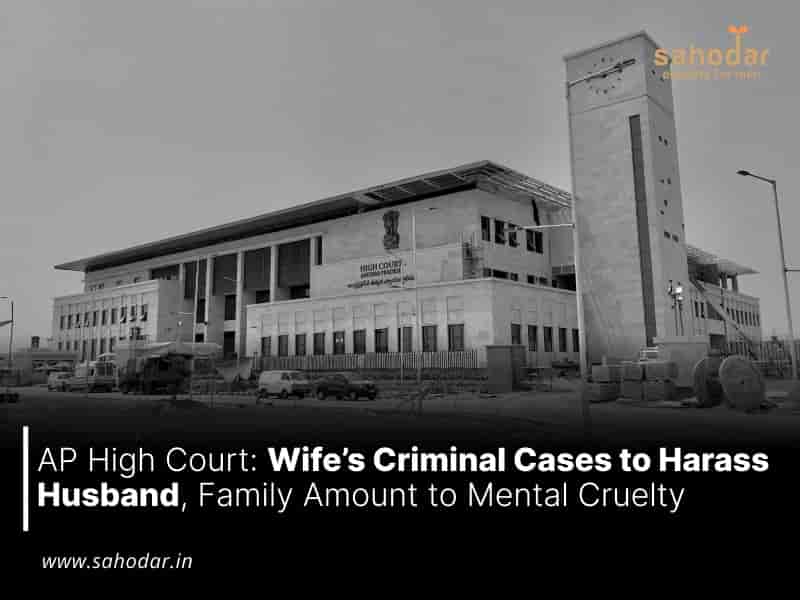The Andhra Pradesh High Court dismissed an Appeal of a wife against the Decree of Divorce passed by the Principal Senior Civil Judge under Section 13(1)(ia)(ib) of the Hindu Marriage Act, 1955.
The Andhra Pradesh High Court ruled that criminal cases filed by a wife to embarrass and imprison her husband and his family amount to mental cruelty under Section 13(1)(ia) of the Hindu Marriage Act, 1955 (HMA).
This decision was made in an appeal filed by the wife challenging the divorce decree passed by the Principal Senior Civil Judge under Sections 13(1)(ia) and (ib) of the HMA.
A Division Bench of Justice Ravi Nath Tilhari and Justice Challa Gunaranjan observed, “Mental cruelty cause much serious injury than physical harm. The criminal cases filed by wife to embarrass and incarcerate the husband and his family members cause persistent trauma, humiliation in social circle which amount to mental cruelty under Section 13(1)(ia) of H.M.Act, and particularly when in reality they are not guilty and so acquitted. Such can only be imagined by others.”
The Bench explained that since mental cruelty is hard to prove, the usual standard applied in criminal proceedings is proof by a preponderance of probabilities, rather than beyond a reasonable doubt.
Factual Background
The respondent-husband stated, among other things, that the appellant was his legally wedded wife. Their marriage was solemnized in 1994 according to Hindu rites, caste, and customs. At the time, the husband worked as a lecturer at a coaching centre, while the wife, a graduate, lived with her parents. The marriage was said to be without any dowry. However, just three days after the wedding, the wife expressed that the marriage was against her wishes. It was alleged that she began behaving abnormally and, shortly after the marriage, left for Tirupati under the pretext of attending to work duties. Although she stayed at the matrimonial home for brief periods, her behavior caused the husband significant frustration and mental anguish.
There was no cohabitation between the couple, and the wife allegedly neglected even her basic duties as a spouse. The husband recounted numerous incidents highlighting the mental anguish and cruelty he endured from the wife. Attempts at mediation by family elders failed, as the wife reportedly demanded a large sum of money. As a result, the husband felt he had no choice but to seek a divorce. The wife filed a counterclaim denying the cruelty allegations, alleging that the husband took dowry and repeatedly demanded more. She also claimed harassment and ill-treatment by the husband. The trial court found the relationship irreparably broken and granted the divorce in favor of the husband. Aggrieved by this decision, the wife appealed to the High Court.
Reasoning
The High Court in view of the facts and circumstances of the case, said, “… the mental cruelty is a state of mind, the feeling of deep anguish, disappointment, frustration in one spouse caused by the conduct of other. The ill-conduct must be persistent for a fairly lengthy period, where the relationship has deteriorated to an extent that because of the acts and behaviour of a spouse, the wronged party finds it extremely difficult to live with the other party any longer.”
The Court observed that the wife’s act of filing a criminal complaint under Section 498-A of the Indian Penal Code, 1860, against the husband and his parents—who had to seek bail and were eventually acquitted due to lack of evidence—amounted to conduct causing mental cruelty and distress to the husband.
“It amounted to mental cruelty and furnished a ground for divorce under Section 13(1)(ia) of the H.M.Act. … Additionally, the parties are living for the last 29 years separately and before that they lived together for short period as is clear from the pleadings of the parties”, it added.
The Court further noted that, although the wife submitted an affidavit expressing her willingness to resume living with the husband, the husband also filed an affidavit stating that she had harassed him and his parents by lodging a false complaint. Although they were acquitted, the ordeal caused significant mental agony to him and his entire family.
“The parties are living separately for last 29 years and there is no chance for reunion. In his evidence also as P.W.1, the husband deposed to that effect that in view of false implication in criminal case, reunion is not possible. Considering the facts and circumstances of the case and also the period of long separation coupled with the affidavit of the husband. We are in agreement with the view taken by the learned trial court that now it is not possible for the parties to lead a matrimonial life together”, it observed.
The Court concluded that since the ground of cruelty had been established, overturning the divorce decree would only further aggravate the suffering of both parties.
“The relationship is beyond repair. The marriage has become a fiction. … In view of the above considerations, we hold on Point-A that the ground of ‘cruelty’ under Section 13(1)(ia) of H.M.Act was established to grant divorce. We hold on Point No.B that there is no illegality in the decree of divorce granted by the learned Trial Court. The same calls for no interference and is affirmed”, it also remarked.
Accordingly, the High Court dismissed the Appeal and upheld the divorce decree.

